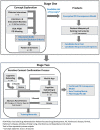The Parkinson's Disease Activities of Daily Living, Interference, and Dependence Instrument
- PMID: 31745478
- PMCID: PMC6856450
- DOI: 10.1002/mdc3.12833
The Parkinson's Disease Activities of Daily Living, Interference, and Dependence Instrument
Abstract
Background: Individuals with Parkinson's disease often experience periods of off time when their motor symptoms are poorly controlled, significantly impacting their lives.
Objectives: To identify the consequences of motor fluctuations on day-to-day activities and areas of unmet treatment priority among individuals with moderate to advanced Parkinson's disease, to assess whether existing patient-reported outcome instruments adequately capture these consequences and priorities, and based on these evaluations, to adapt an existing or develop a new instrument.
Methods: The research was conducted in 2 stages: concept exploration and content confirmation. Concept exploration included direct input from individuals with Parkinson's disease representing the intended context of use via concept elicitation interviews. Content confirmation and item refinement was achieved through 5 rounds of cognitive debriefing. Final rounds of cognitive debriefing also included usability testing of the draft instrument for electronic data capture.
Results: Concept elicitation interviews were conducted among 29 individuals with Parkinson's disease (55% male; mean age 60.8 years). Concept saturation was achieved quickly with more than 90% of concepts identified by the end of the 16th interview. None of the existing outcome instruments were found to be fit for purpose in the intended context of use; therefore, a new instrument was developed. After 5 rounds, cognitive debriefing participants indicated clear and consistent interpretation of the items.
Conclusions: Evidence from this study supports the content validity of the Parkinson's Disease Activities of Daily Living, Interference and Dependence Instrument as the basis of a clinical trial endpoint for capturing priority treatment benefit outcomes to individuals with moderate to advanced Parkinson's disease experiencing motor fluctuations.
Keywords: Parkinson's disease; activities of daily living; independence; motor fluctuations; patient‐reported outcomes.
© 2019 International Parkinson and Movement Disorder Society.
Conflict of interest statement
This study was funded by Pfizer. Ms. Deal and Ms. Myers are currently employees of Pfizer and were so employed at the time the study was conducted. Their compensation includes company stock. Dr. Gray was also employed by Pfizer at the time this study was conducted. He is now employed by Cerevel Therapeutics. Mr. Devine was an employee of ICON, plc at the time the study was conducted. His ICON compensation included company stock. Mr. Devine is now employed by Genentech. Ms. Flood was employed ICON, plc, at the time the study was conducted. Her ICON compensation included company stock. ICON was contracted by Pfizer in connection with the conduct of the study. Ms. Flood is now employed by AstraZeneca.
Figures


References
-
- Parkinson's Foundation . Understanding Parkinsons/causes‐and‐statistics/statistics. http://parkinson.org/understanding-parkinsons/causes-and-statistics/stat.... Accessed July 22, 2018.
-
- Mayo Clinic . Parkinson's disease—symptoms and causes. https://www.mayoclinic.org/diseases-conditions/parkinsons-disease/sympto.... Accessed June 30, 2018.
-
- Center for Drug Evaluation and Research, U.S. Food and Drug Administration . The voice of the patient: a series of reports from the U.S. Food and Drug Administration's (FDA's) patient‐focused drug development initiative: Parkinson's disease. https://www.fda.gov/downloads/forindustry/userfees/prescriptiondruguserf.... Accessed August 25, 2019.
-
- Mayo Clinic . Parkinson's disease—diagnosis & treatment. https://www.mayoclinic.org/diseases-conditions/parkinsons-disease/diagno.... Accessed June 30, 2018.
-
- Vijayakumar D, Jankovic J. Drug‐induced dyskinesia, part 1: treatment of levodopa‐induced dyskinesia. Drugs 2016;76(7):759–777. - PubMed
LinkOut - more resources
Full Text Sources

